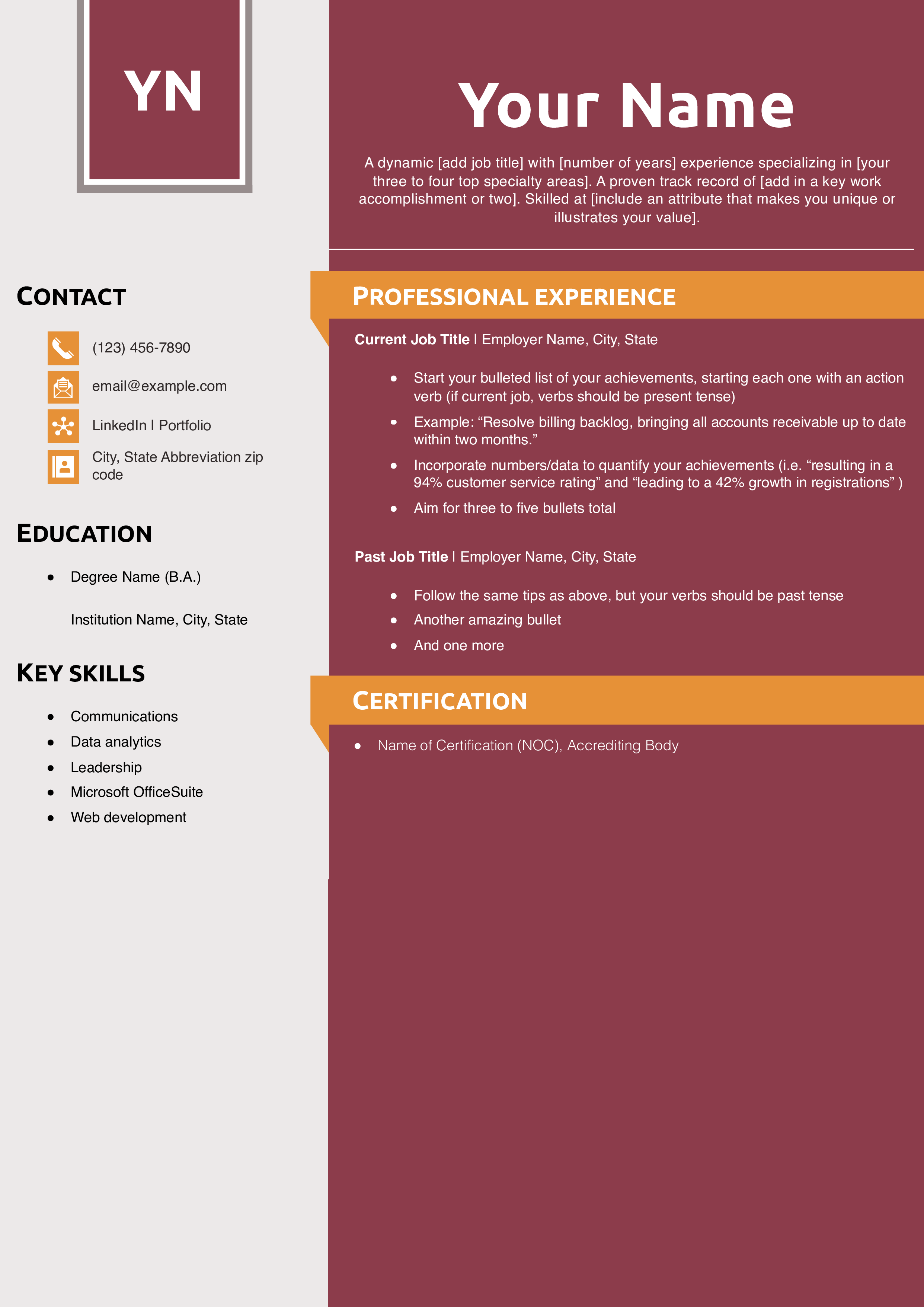Hybrid Resume Examples and Templates
If you struggle to create a resume because you lack a traditional work history, you may want to consider using a different template. A hybrid resume has the same general information as other resume types.…

No matter which type of role you’re seeking, creating a strong resume that highlights your top skills and accomplishments can make a good impression on recruiters and hiring managers. Summarize what makes you a quality candidate for the particular role you are seeking. This guide and blank resume template will show you the most important components that make up an accomplishment-driven resume.
A blank resume template can point you in the right direction and organize your thoughts if you’re creating a new resume from scratch.
You can turn a blank resume into a completed one by filling in these sections:
Provide your most current contact information so recruiters can contact you. This should include your full name, phone number, a professional email address, your location, and a professional website or profile page link.
Your Name
(123) 456-7890
[email protected]
City, State Abbreviation Zip Code
LinkedIn | Portfolio
Begin your resume by creating a summary of your professional highlights, including your top skills and achievements in your field. Considering that the total employment is projected to grow just 0.3% annually through 2032 (which is slower than the 1.2-percent annual growth recorded over the 2012-22 decade), you want to be sure that you stand out from your competition.
Incorporate keywords from the job postings you are interested in to help illustrate you’re well-aligned for the role.
A dynamic [add job title] with [number of years] experience specializing in [your three to four top specialty areas]. A proven track record of [add in a key work accomplishment or two]. Skilled at [include an attribute that makes you unique or illustrates your value].
Your resume reader should be able to quickly scan and find the specific skills that make you a top candidate for the job. Offer a mix of hard skills related to the technical and hands-on duties of the role and soft skills that are essential to any field. Strategically include ones that align best with what your employers of interest are looking for.
| Hard Skills | Soft Skills |
|---|---|
| Data analytics | Adaptability |
| Market research | Communications |
| Microsoft OfficeSuite | Customer relations |
| Search Engine Optimization (SEO) | Leadership |
| Vital signs monitoring | Organization |
When writing the job history section of your resume, instead of listing your job duties, think about using impactful action verbs to tell your professional story. It will make for a more exciting and interesting read for the recruiter and show how you executed and performed in your past roles. Some examples of action verbs you can use include:
| Action Verbs | |
|---|---|
| Coordinated | Developed |
| Enhanced | Executed |
| Generated | Managed |
| Optimized | Resolved |
| Supported | Spearheaded |
This section makes up the bulk of your resume and describes your previous roles. For each entry, include employer names, dates of employment, and your list of accomplishments. If you can quantify your results, do so.
Current Job Title, Employer Name, City, State
Start date month and year – End date month and year
Past Job Title, Employer Name, City, State
Start date month and year – End date month and year
Sprinkling in some metrics and data to demonstrate the value you’ve brought to your past positions can help hiring managers envision how you can contribute to their organization. Think about sharing how your work impacted return on investment (ROI), boosted productivity, cut costs, improved outcomes, or increased customer satisfaction.
Though it’s OK to have one master resume, tweak it each time you send it out to match what that specific employer is seeking. It could mean reworking some of your keywords, including slightly different skills, or bringing something in your job history to the forefront if it’s particularly relevant.
Writing a resume can be challenging if you are a recent graduate without much work experience. The good news is your school-related experiences, internships, and volunteer work all have helped you develop skills and they can be included. For example, you can share relevant coursework you’ve completed, highlight how you’ve learned, adapted, and applied your knowledge in real-world settings, and emphasize your work ethic and enthusiasm for the field.
The last major resume section is your education. According to Georgetown University’s Canter on Education and the Workforce, by 2031, 72% of jobs in the US will require postsecondary education and/or training. List all of your degrees, certifications, and other relevant continuing education or training programs that indicate you are qualified for the role you are applying for. Each degree or certificate entry should include the title, the institution name, and the date of completion.
Degree Name (B.A.), Start Date Month and Year – Completion Date Month and Year
Institution Name, City, State
Your Name
(123) 456-7890
[email protected]
City, State Abbreviation zip code
LinkedIn | Portfolio
A dynamic [add job title] with [number of years] experience specializing in [your three to four top specialty areas]. A proven track record of [add in a key work accomplishment or two]. Skilled at [include an attribute that makes you unique or illustrates your value].
Current Job Title, Employer Name, City, State
Start date month and year – End date month and year
Past Job Title, Employer Name, City, State
Start date month and year – End date month and year
Degree Name (B.A.), Start Date Month and Year – Completion Date Month and Year
Institution Name, City, State
Resume Templates offers free, HR approved resume templates to help you create a professional resume in minutes. Choose from several template options and even pre-populate a resume from your profile.